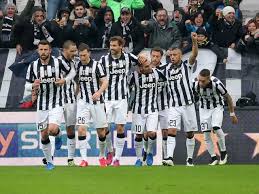The Bianconeri collected a fourth straight Scudetto, and they will keep winning until another club gets things right in both business and sporting aspects, writes Kris Voakes.

They’ve done it again. Juventus has won a fourth straight Scudetto and, judging by the huge gap between the Bianconeri and the rest both on and off the field, there could be plenty more to come.
The turnaround on the field is well known. A Serie B side just eight seasons ago after being ravaged by the Calciopoli verdicts, the club took its time reaching the top once more. But since its Serie A title success in 2011-12, Juve has not looked back.

Juve has packed its first-team squad with star quality, and the only concern over the likes of Carlos Tevez, Arturo Vidal and Paul Pogba comes in Juve’s ability to retain players of their caliber in an increasingly uncompetitive league.
But the strides off the field have been equally as impressive, and indeed have helped to set the platform for the annual collection of Italy’s most important silverware.

Since Andrea Agnelli took over the presidency in 2010, Juventus has gone from strength to strength. The opening of Juventus Stadium has assisted the climb, with the new arena helping to boost matchday revenue by over 300 percent compared to the last season at the Stadio Olimpico.
But it is a project that was always close to Agnelli’s heart. The club first discussed the possibility of building a new stadium as far back as the mid-1990s. “The Stadio delle Alpi was only 20 years old but was built with old concepts, so from 1995 or 1996 one of the priorities of the company was to have a new stadium,” the president told the London Business School (LBS) in 2012.
Red tape, followed by the fallout of Calciopoli, delayed the timetable significantly. Yet the inauguration of the new structure in 2011 has provided the rest of Italian football with a model to replicate.
In their final season at the Olimpico, the Bianconeri were pulling in miniscule crowds for a negligible standard of football, with no Champions League money coming in and a loss of the previous leverage held by the bigger clubs before the collective bargaining agreement was brought in over broadcasting contracts. It was a vicious cycle.
Now Juve not only keeps winning titles, but it also continues to record increased revenue in all areas. It is a far cry from the club's position five years ago.
“When I took direct responsibility of the club, we knew that we had to completely turn around both the team and the company,” Agnelli explained to the LBS.
“A lot of unwanted overheads – such as players who had underperformed but no other club wanted to buy – were fixed into the balance sheet. In order to get some of the players to leave we had to pay them incentive money. So when I analyzed the situation in 2010 I knew what I was getting into, and we’re going to post a significant loss [in 2011-12] as well, although it will be far from the previous one, and that was part of the plan approved at boardroom level in July 2011.
“Following that, if everything goes to plan we should start to fall into an equilibrium by the 2012-13 results. That should bring us back on track in terms of the investments we’ve made, lower the average age and give us better quality. Returning to victory is part of it because that will increase commercial sponsorships and media rights.”
Three years on from that conference, Agnelli’s words have proved extremely prophetic. Commercial sponsorship – like matchday revenue – is up, as is broadcasting income, which will increase again in this season’s figures thanks to the larger UEFA pool as one of only two Italian Champions League clubs.
The more Juventus succeeds on and off the field, the more Italy needs to follow. Sassuolo has built its own stadium, while the likes of Roma and Milan have plans in the pipeline. Calcio cannot catch up soon enough.
In the meantime, the Bianconeri are the best in the business and are only getting better. They are unlikely to stop at four.

No comments:
Post a Comment